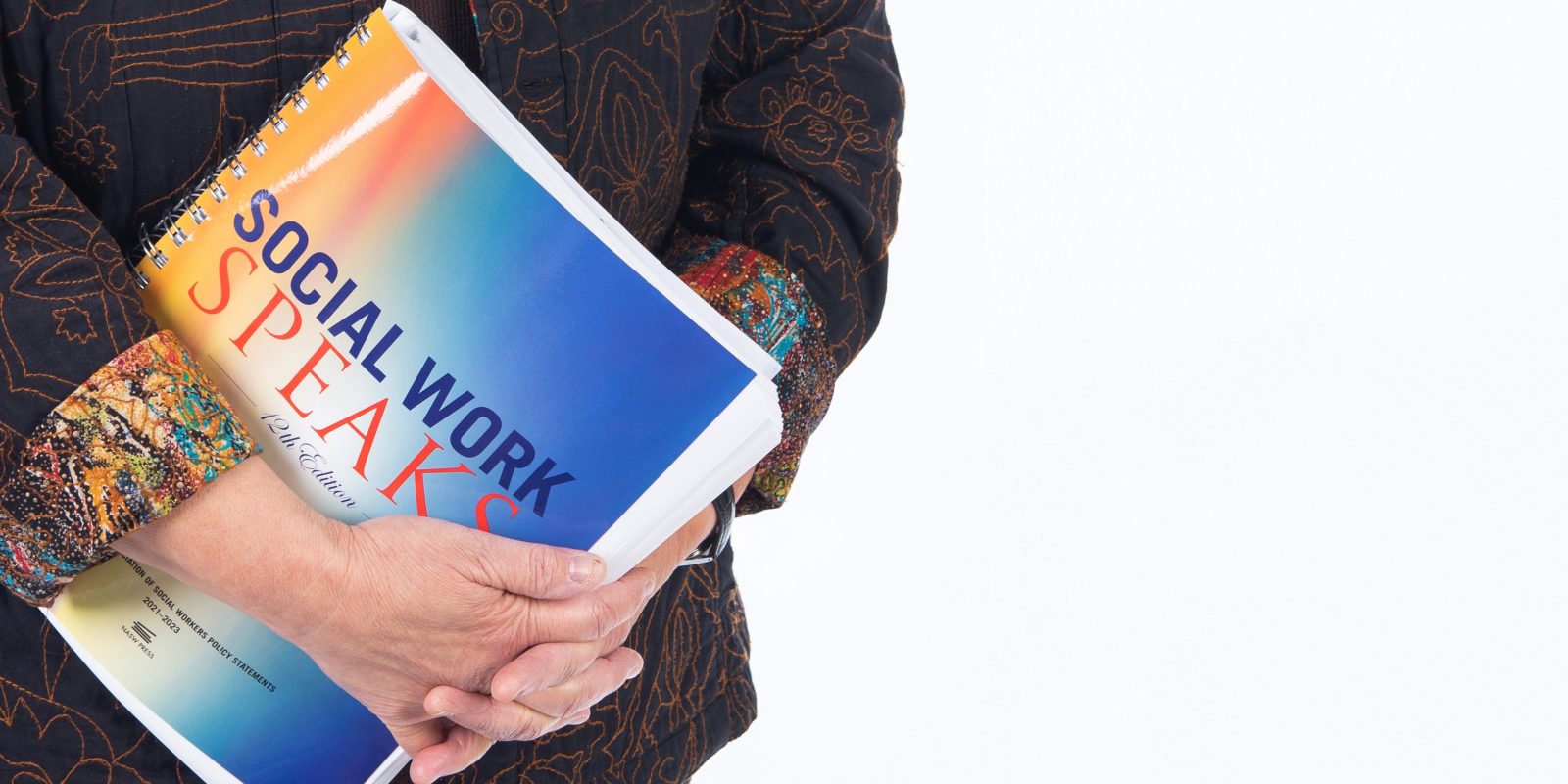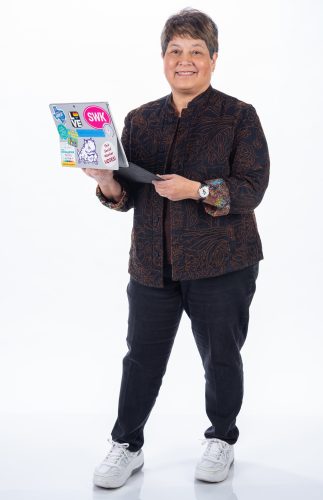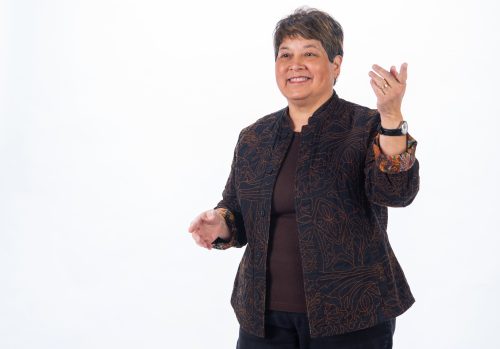
Photo by Glen E. Ellman
Lynn Jackson’s Heart for Helping
The Harris College professor works to improve the world as a social worker, volunteer, activist and mentor.
At TCU since 2013, Lynn Jackson is mentoring the next generation of social workers. She is professor of professional practice and assistant dean for strategic initiatives in the Harris College of Nursing & Health Sciences. Jackson has served her community by helping offenders assimilate back into society, working for reproductive rights, conducting research and teaching.
Before you went to college, you volunteered in hospitals and wanted to be a nurse. Why did you choose to pursue social work as a career?
I was a candy striper for the Red Cross. I thought I wanted to be a nurse and I did a lot of volunteer work to get prepared. But when I started college, I thought about my strengths and weaknesses and realized that math and science — I hadn’t enjoyed it.

Lynn Jackson says social workers “can be strong advocates; we can be involved in the legislative system.” Photo by Glen E. Ellman.
I started to rethink how I wanted to help people. So I thought, “let me look for a different helping profession,” and that’s what led me to social work. I realized I could still be in the medical area if I wanted to; I could have everything I wanted by doing social work.
I did a lot of volunteer work in child welfare when I was in college. I loved the flexibility of the profession and the fact that it also had this social justice component to try to help people who were marginalized and didn’t have a lot of resources. It really fit with my own value structure.
I have always cared about people who struggled, from the time I was little. My sister and I would go and help this woman down the street, who was blind, with cleaning. She always offered to pay us, but my parents were against that; we did it because we wanted to — not because we got paid. My parents really instilled in me the value of giving back and helping other people.
As I learned more about the social work profession, I realized we could make a difference at a policy level, too. We can be strong advocates; we can be involved in the legislative system.
Why is social work important to our communities?
Historically, social work has been connected with social policies. If you go back to after the Great Depression, we didn’t have an infrastructure around social agencies or policies. That was why FDR was voted into office; we needed more infrastructure than just what a family or church could provide, which is historically how things have been done.
FDR was really smart and he had a lot of social workers helping him. There’s historical ways that social workers have formed labor policy and even policies around Social Security.
Unfortunately, we’ve also been involved in things that weren’t so great. There were social workers involved in putting the Japanese in internment camps. We were also involved with putting Native Americans into boarding schools.
What I’m hoping is that we’re educating people to be able to go, “Wait a minute.” Right now, for instance, our national association is looking to be an anti-racist organization. We really want to highlight how important that is, that we look at things through a social justice lens. That’s what really sustains me and helps me; we’re evolving and we’re trying to look at ways to make a difference.
You’ve worked with people in nursing homes and people who have been incarcerated. How did you figure out what you wanted to specialize in?
When I first graduated, I thought that I would work in child welfare; that’s what I had done during my internship. But probably my most rewarding job was working with offenders with drug and alcohol problems.
My first job was working for the housing authority because when I tried to get a job in child welfare, I just didn’t have enough experience. I worked for a nursing home and found out that I really liked older adults. Even my job working with offenders I started just as a part-time job doing some counseling and I ended up finding out how much I loved it.
I worked a lot in residential programs, with individuals with developmental disabilities or intellectual disabilities. I always liked working in residential programs because you could see them for longer periods of time and get to know them. I never liked it if I just saw someone once a week.
What did you find rewarding about working with offenders?
When I was in Florida, people were coming to us [residential program] instead of going to prison, and then some people were coming to us after they got out of prison. The idea was to provide drug and alcohol treatment in real time, help them be able to get a job and be out in the community while still having a little bit of a safety net as they were learning how to cope with problems or stress.
It was a wonderful opportunity to work one-on-one with people and do group work with them. At the time we didn’t realize that we were doing a lot of trauma informed care, especially for women who often had been abused as kids. That’s really the lens we look at all of this through.
It was challenging. Certainly it was a group of people I had never been around. I enjoyed that I found a lot of humanity there; some people made bad decisions, but it didn’t make them bad people. Seeing a woman deal with an addiction and past abuse, and work to get custody of her kids back — it was rewarding.
What inspired you to return to school after a decade in the field to pursue your master’s in social work — and after another decade in the field to complete your PhD in social work?
I always thought my journey would go more quickly than it did. I thought I’d be back in a master’s program within a couple of years and then write my PhD. But sometimes things get in the way. I was working and enjoyed my job, and then we bought a home and got into some debt, and then it was harder to go back to school.
As I had social work supervisors, I started thinking that I could do equally as good of a job if I had more education. I decided it was time, though it had been 10 years.
“It might take you longer than you think, but you still can accomplish something that you set out to do.”
Lynn Jackson
I thought I’d go back a couple of years later to get my PhD, but I loved what I was doing. I was working with offenders and really found a niche for myself. It took me longer than I thought, but I did go back to school again after 11 years. I tell people that story because I was a first-generation student. It might take you longer than you think, but you still can accomplish something that you set out to do.
My reason for going back to the PhD was this idea that I could teach. I really liked the flexibility of academia; the idea of being able to specifically teach field education with the internships really appealed to me. I can still do my advocacy work; I can still go to a rally or go speak with a legislator. All of that was really a good fit.
How did you come to be involved in advocacy and research about reproductive rights?
After I graduated with my master’s, I decided that I needed to do more work around women’s reproductive rights. I thought women weren’t going to be able to make any progress in jobs if they couldn’t control their ability to have children.
Which awards have you received?
I’m really proud of when I was a Women’s Health Hero [awarded by Our Bodies Ourselves in 2010] for my case management work with the National Network of Abortion Funds.
In 2020, I won the National Association of Social Worker Lifetime Award for our local area, Tarrant County, and I won it at the state level, too. That was for my work with the National Association of Social Workers — I was a branch chair, I was president of NASW Texas for two years and I was on the Women’s Issues Committee — but also my work as a social worker over the years and my volunteer work.
This is my last year as a representative to the national board that’s out of Washington. I really have loved my work with it; it was a way to just understand the profession more and get to provide something back to them, because I feel like the profession has given so much to me.
What does being the director of field work for the social work department entail?
I take the lead with all of the students and help match them to an agency. I’ll meet with the students individually, and we’ll talk: Do they have an interest in child welfare or older adults? Some of them want to work with homelessness. We have over 100 agencies that have agreed to take student interns.

“We’re training students to be advocates and to set themselves apart,” says Lynn Jackson. Photo by Glen E. Ellman
Then we set it up. I do an orientation with the students and I do all the training with the instructors, so they understand what we expect, and then talk them through the evaluation process, what kind of activities we want to see, the path we want to see.
I also teach a seminar class, so the students are talking about what’s going on in their internships. We’ll do some in-class activities and we work in the leadership center so that everyone can get their top five leadership skills through the CliftonStrengths test. Students understand even if they don’t want to stand up in front of a group, they’re still a leader, even if they’re doing a one-on-one session with a client. All of our master’s students will take a social work licensing exam before they leave so we do prep work for that, and we do a mock interview process with all of our students.
I stay pretty busy just trying to make sure we have enough agencies and dealing with problems as they come up. We just brought on a new system for tracking; our students complete a log every week, telling us what they’ve done, so that we can make sure that they’re getting the kind of experience that we want them to.
My professional experience led me perfectly to be able to be on a faculty; a lot of my experience comes in handy. I’m able to normalize things for students, to work closely with their agency instructors to help them have a really good experience.
You’ve mentioned working with Harris colleagues to facilitate interprofessional learning. What makes the TCU social work department stand out from other programs?
It’s about how we can help our students understand the importance of working together in teams. All of the disciplines in Harris, as well as nutrition and public health, we all read a book together. We’re going to be looking this semester at values and ethics based on that book, and next semester we’re going to be looking at race. We’re teaching the students to learn about, from and with each other. I feel really proud of what we’ve been able to do — to show that when teams work together, they can improve patient care and the safety of the patient.
We are training every social work student at TCU to understand clients and systems from a trauma-informed lens because many community agencies use this approach. The other thing that we’re doing is looking at things from a social change perspective. It’s not enough to just recognize racism — we have to do something about it. We’re training students to be advocates and to set themselves apart.
Editor’s Note: The questions and answers have been edited for length and clarity.

Your comments are welcome
Comments
Related reading:
Research + Discovery
Human Trafficking Victims Can Advise Social Workers
Mary Twis explores techniques to listen to and support survivors as they rebuild their lives.
Research + Discovery
Community Support Helps Families Rise to a Challenge
Assistant professor Aesha John researches the understanding, impact and resources of parents with an intellectually disabled child.
Features, Research + Discovery
Don Greenwood Explores How Social Workers Can Help Stop Human Trafficking
Advocates can better link survivors with new sources of support.